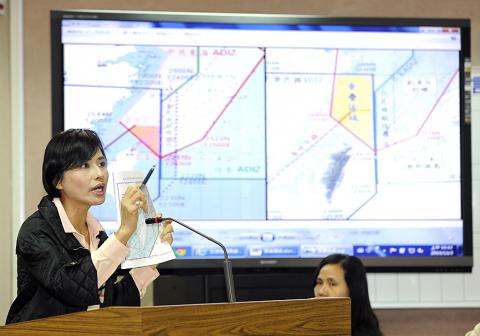|
Legislators chastise
no-show NSC boss
NOT ON: The DPP’s Mark Chen said that though
there is a precedent for the NSC head being absent, China’s air zone should be
considered an incident of grave importance
By Lo Tien-pin and Jake Chung / Staff reporter, with staff writer

Democratic Progressive Party
Legislator Chiu Yi-ying comments on China’s air defense identification zone and
that of Taiwan at a meeting of the Foreign Affairs and National Defense
Committee at the Legislative Yuan in Taipei yesterday.
Photo: Chen Chih-chu, Taipei Times
The Legislative Yuan’s Foreign Affairs and
National Defense Committee yesterday passed a motion chastising National
Security Council (NSC) Secretary-General Jason Yuan (袁健生) for being absent from
a committee meeting specifically held to address the government’s assessment of
the situation following China’s unilateral declaration of an air defense
identification zone (ADIZ).
Among the officials invited by the legislative committee were Yuan, Minister of
National Defense Yen Ming (嚴明), National Security Bureau Director Tsai Der-sheng
(蔡得勝), Minister of Foreign Affairs David Lin (林永樂), Deputy Minister of
Transportation and Communications Chen Chun-ching (陳純淨) and Mainland Affairs
Council Deputy Minister Chang Hsien-yao (張顯耀).
However, Yuan did not accede to the committee’s repeated requests to attend the
meeting to report on the government’s stance and policies with regard to
Beijing’s move to create the zone.
The NSC is the main government unit that makes policies and decides on the
responses to such issues, said committee convener Democratic Progressive Party (DPP)
Legislator Chiu Yi-ying (邱議瑩), explaining why Yuan was summoned.
That the NSB secretary-general, who by rights should report to the legislature
on all issues of national security and whose bureau is responsible for the
government’s policy concerning the ADIZ, should be missing from such a crucial
meeting was incredible, Chiu said.
In a vote, the committee later passed a motion condemning Yuan for his failure
to attend the hearing.
At the meeting, DPP Legislator Tsai Huang-liang (蔡煌瑯) said the inaction of the
administration of President Ma Ying-jeou (馬英九) when China was practically
knocking at the nation’s door was only encouraging Beijing’s belligerence.
“Yuan [thinks he] is sly, but the committee is willing to give Yuan more time;
it only takes five minutes to get to the Legislative Yuan from the NSC,” Tsai
said before the vote was passed, adding that by refusing to attend the meeting
Yuan was evidently trying to avoid his responsibility.
DPP Legislator Mark Chen (陳唐山), who has previously served as foreign minister,
said that though there is a precedent for the NSC head being absent from the
legislature, the establishment of the air zone should be considered an incident
of grave importance and Yuan should have attended the meeting.
“Yuan must make a report to the legislature on this matter,” Chen said. “Only by
doing so can the Ma administration show that it is being a responsible
government.”
Meanwhile, DPP Legislator Chen Ou-po (陳歐珀) criticized the myriad stances of the
officials in Ma’s Cabinet.
“At best, they only dare to say they regret China’s decision, but they have not
expressed their opposition,” Chen Ou-po said.
Chen Ou-po then asked all five of the invited officials to “please raise your
hand if you feel that China’s establishment of the ADIZ in the East China Sea is
an unfriendly gesture.”
Yen, Tsai and Chen Chun-ching raised their hands, while Lin and Chang did not.
When pressed to make clear their stance on the issue, Yen said that China’s
action was an “unfriendly” move and that although part of China’s air defense
zone overlaps with Taiwan’s, Beijing “did not consult us beforehand.”
Lin said repeatedly that Taiwan has already expressed its stance on the issue,
while Chang said the council has expressed its opinions to China’s Taiwan
Affairs Office through the proper channels.
|
![]()
![]()
![]()